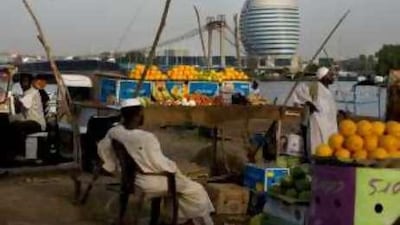KHARTOUM // Sudan may be better known for atrocities in Darfur, teeming refugee camps from decades of civil war and more recently the indictment of its president for war crimes, but there is another story unfolding in Africa's largest country.
Surging oil revenues and the privatisation of several key industries have triggered an economic boom, and its significance has not been lost on investors from the UAE. Abdel Dafi Ali, an official at the Ministry of Investment, says one prospective Emirati investor who visited his ministry recently even drew a parallel with Dubai in its early years. "He said to me: '25 years ago, the UAE had plans to develop, but I did not believe that. I thought it was just a piece of desert. I missed my chance. Now I have come to Sudan to get back that chance'," said Mr Ali, who is in charge of foreign investment at the ministry.
The similarities extend to the design of Khartoum's highest profile new hotel, the Burj Al Fateh, with its curved outline reminiscent of the Burj Al Arab. The Libyan-owned luxury hotel is just one of several new shiny steel and glass structures changing the skyline of the once flat, dusty desert town. On any given night, the outdoor tables at The Ozone Café are packed with wealthy Sudanese teenagers, Arab businessmen and western aid workers enjoying pastries and US$4 (Dh14.70) cappuccinos while being cooled by a fine mist from the outside air conditioner.
Sudan started benefiting from oil export revenues in 1999, but the investment climate really picked up in 2005, when the country emerged from a 20-year civil war between the Muslim north and the Christian south. China, the largest investor in Sudan, consumes most of the country's oil exports. It has been criticised by human rights groups for helping to strengthen the Khartoum government, which is accused of backing militia responsible for mass rape and killings in Darfur.
American investors are conspicuously absent from the boom in Khartoum, due to a trade embargo imposed in 1997. Washington accuses the country of supporting terrorism and human rights violations. But close cultural ties and proximity just across the Red Sea have attracted droves of Arab investors. The UAE is the fifth-largest investor in Sudan. Earlier this year, the Abu Dhabi Fund for Development led talks to buy 29,400 acres of farmland in northern Sudan to grow crops that will be used to build up the UAE's strategic food reserves.
This month, Bin Omeir Holding Group, an Abu Dhabi-based company, signed a deal to build a sugar refinery south of Khartoum. Other UAE companies have invested in hotels, banks and oil infrastructure in Sudan. Emiratis invested upwards of $300 million in Sudan last year. "We are close politically to each other," said Essa Albasha Alnoaimi, the UAE's ambassador to Sudan. "UAE has a diversity of investments in Sudan. All UAE investments in Sudan have been very successful."
One of the nicest hotels in Khartoum, the Rotana, is part of an Abu Dhabi-based chain. When the Rotana opened in Khartoum in February last year, it was the chain's first property in sub-Saharan Africa, according to Christina Fernando, the group's marketing manager. "We believe that it is a good climate for development in Sudan," Ms Fernando said. "Sudan is like a virgin market. You can develop it as beautifully as the UAE."
Sudan's tourism industry is negligible, but the Rotana caters mostly to investors and aid workers. Occasionally, the political climate in Sudan affects business at the hotel, Ms Fernando said. In June, when prosecutors at the International Criminal Court indicted Omar al Bashir, the Sudanese president, the hotel was nearly empty. The trade embargo with the US means credit cards are not accepted anywhere, and bills are settled with cash or wire transfers.
Nevertheless, the Rotana is doing so well in Khartoum that the company plans to open another hotel along the Nile River, near the Burj Al Fateh. Well-to-do Sudanese like to compare their capital to Dubai. While an indoor ski slope might not be on the cards yet, Khartoum residents are excited about economic growth and oil wealth. They point to the new hotels and cafes and dream of development on a scale already visible in the Gulf. mbrown@thenational.ae

